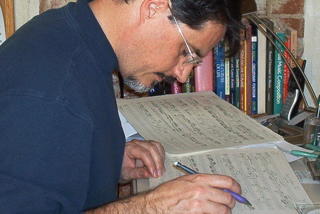
One of the best aspects of the incarnation of CbJE of which I was a part was the dizzying diversity of our musical backgrounds. The six of us had an unusually wide bandwidth of interests and formative experience. This was not fully appreciated at the time, but in my view it was what made our shows, recordings and arrangements so unusual. It also made for some stress at times, as we could individually have intensely differing views on how to interpret a song, or even how to count it off. For example, I remember that when we were learning "Strange Case" we simply could not agree on where the real accents lay on the song's riff. Each member felt the song in a different way, and because we all had different amounts of formal training (ranging from lots to none at all), we didn't really have a common language with which to discuss the problem. We set the song aside for a while and revisited it just before the 'Rochester Sessions' radio show. There Jimmy counts us off, but once it starts the actual meter is very obscure. (I still try notating it in varying ways even to this day...) We simply listened to each other, rather than trying to consciously define the metric. It worked.
Chuck was an utterly natural musician, unable to read music, but he could pick up nearly any instrument and make it do his bidding. He loved jug band music, Bob Dylan, Captain Beefheart, polka music and much, much more. Phil Marshall was more elaborately schooled, having had some classical guitar background in addition to his experience with rock and fusion-type bands. Jimmy, our drummer, had deep roots in country-western and Irish music, as well as an extraordinary sense of time—superior to that of any conservatory-trained percussionist I have ever met. Ken our bassist, was steeped in punk and Johnny Cash, concerned with stripping anything to its purest essence. His muscular bass lines are models of economy and power. Joe "The Bone" Colombo, our trombonist, studied music at SUNY Fredonia and then did a stint as a musician in the Army. He loved jazz. His huge sound and nimble chops were an important part of our sound, and I enjoyed working with him immensely. As for me, I was (and remain) a bizarre blend of uptight dorkiness and wild abandon, represented by my twin interests in classical music and free jazz. Seldom could I find the middle of those two poles.
Besides bringing this incoherent and contradictory wealth of experience to the band, we all continued to practice and study on our own. This consisted of actual instrumental practice, listening to new or unfamiliar music, and frequent conversations (or arguments) about why a song or performance was or was not a great one. I spent a lot of time listening to and trying to emulate early rock 'n roll saxophonists, like Herbert Hardesty, the great soloist on those early Fats Domino records. Ken rekindled my interest in Johnny Cash, and I tried to make my own playing as lean and elegant as the guitar lines of Luther Perkins. ("Keep trying, McIntire," I hear them mutter...)
As a collective whole we were, even more importantly, primarily interested in AMERICAN musical styles. This is a fact that rarely gets observed. When we were interviewed by some music press in Oslo, a reporter commented, "You are the most American-sounding band I've ever heard." I thought at the time that it was a shame that we had to travel to Scandinavia before that crucial fact was noticed by any reviewer. Mostly reporters focused on how "quirky" we were. They failed to notice that the real story was in the breadth of American music that we'd absorbed and the unusual synthesis that we had achieved. Songs like "He Must Have Been Quite a Guy," "Talk to Me," and "Why Should I Stand Up?" stand outside any clear stylistic norms, yet beautifully evoke an epic American quality. I remember hearing those songs at the old Jazzberry's long before I joined the band and was blown away by their power. I clearly remember thinking that I was in the presence of something truly original, that could only have happened in America. It was akin to the first time I heard the music of Captain Beefheart.





